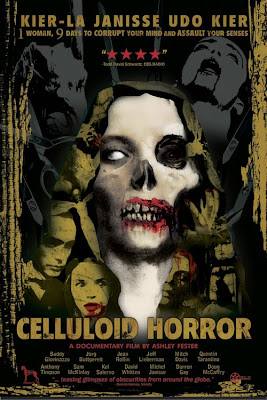Over the past decade, Canadian Kier-La Janisse has emerged as one of the most interesting and insightful genre writers going around. From her contributions to publications like Fangoria and Rue Morgue to her outstanding book House of Psychotic Women: An Autobiographical Topography of Female Neurosis in Horror and Exploitation Films (FAB Press/2012), Janisse writes with an authority, honesty and freshness that is hard not to get swept-up in.
Directed by Ashley Fester, Celluloid Horror is a 2004 documentary which captures Janisse’s crusade to expose the filmgoers of Canada to some of the more obscure, subversive, arty and just plain confrontational extremes of horror cinema, via her CineMuerte (‘Cinema of Death’) film festivals, which she programmed and ran between 1999 & 2005. From Andrzej Zulawski's disturbing 1981 arthouse classic Possession to crowd pleasers like the riotous 1982 Spanish splatterfest Pieces, CineMuerte often challenged its audience into expanding their concepts of what a horror movie is, and garnering a mix of extreme reactions in the process (from verbal abusiveness over choice of films to people fainting over the - admittedly very hard to take - animal footage from Cannibal Holocaust).
Barely scrapping by financially, and fighting a lack of interest from much of the local press, CineMuerte nevertheless expands in subsequent years, bringing in guests like cult Eurotrash actor Udo Kier, French surrealist horror filmmaker Jean Rollin, Jorge (Nekromantik) Buttgereit, Buddy (Combat Shock) Giovinazzo, and Jeff Leiberman, director of two of my favourite mid-70s genre films, Squirm and Blue Sunshine. The sequences with Udo Kier are great fun, particularly when he agrees to help doing a live spontaneous voice-over for a film when the subtitles don’t work. The stresses of running a film festival are also clearly evident, from worries that the ailing Rollin might die while in attendance to the usual frantic dealing with sudden sound drop-outs during screenings. Janisse tackles any setbacks or issues the way she approaches the festival itself, with an energy and dogged determination that the viewer can’t help but admire.
Like her book House of Psychotic Women, Celluloid Horror is almost as much an insight into Janisse’s personal life and sometimes troubled upbringing as it is a testament to her devotion and love of genre cinema, and the film is all the more involving because of it. Spending her time between two fathers (whom she dubs ‘George C. Scott dad’ and ‘Warren Oates dad’), Kier-La talks of her teenage days spent in reform school (where she was deemed "not crazy but dangerous"), and goes through a marriage and subsequent separation during the course of the filming, leading to some uncomfortable moments being captured on camera (Celluloid Horror is a very personal film in many ways - at her introduction to the recent Melbourne screening Janisse admitted that it’s only been since the publication of her book that she has become comfortable with watching and publicly screening the documentary again).
There’s an ample amount of choice film clips included throughout Celluloid Horror - all great clips without doubt, but I found they actually took the pace out of the film and become the least interesting thing about it (I guess it also doesn’t help that we are now much more familiar with the films in question than we might have been at the time CineMuerte were screening them).
Celluloid Horror is available on DVD from Breed Productions, in a release that contains a nice selection of extras, including an audio commentary from the director, extended scenes (I love Kier-La’s amusing Sleepaway Camp Vs. Screwballs story), a 30 minute Q&A with Udo Kier, an episode of Urban Rush featuring Kier and Kier-La, Jeff Lieberman’s post-Squirm Q&A, photo gallery and more. The copy I purchased after the Melbourne screening also contained a series of postcards featuring the poster art for the CineMuerte events over the years, and best of all, a cool little microchip installed, so that when you open the cover you hear the voice of Udo saying "Where is Keir-La/ I’m going to kill her!", as well as a couple of other snippets of dialogue from the film. The spirit of William Castle lives...
Above: Meeting Kier-La after the Melbourne screening of Celluloid Horror on Wednesday, Dec. 4th 2013.


